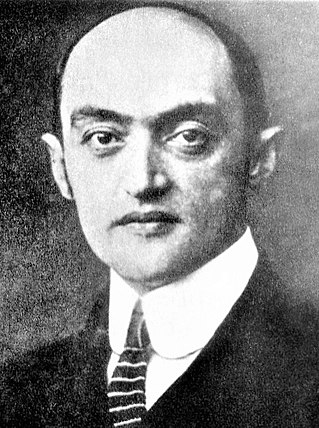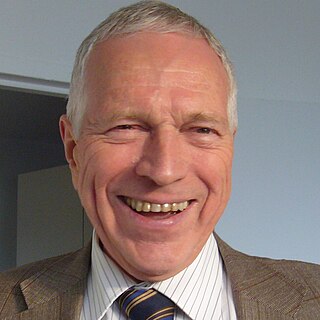
Joseph Alois Schumpeter was an Austrian political economist. He served briefly as Finance Minister of Austria in 1919. In 1932, he emigrated to the United States to become a professor at Harvard University, where he remained until the end of his career, and in 1939 obtained American citizenship.

Nicholas Kaldor, Baron Kaldor, born Káldor Miklós, was a Hungarian economist. He developed the "compensation" criteria called Kaldor–Hicks efficiency for welfare comparisons (1939), derived the cobweb model, and argued for certain regularities observable in economic growth, which are called Kaldor's growth laws. Kaldor worked alongside Gunnar Myrdal to develop the key concept Circular Cumulative Causation, a multicausal approach where the core variables and their linkages are delineated.
Verdoorn's law is named after Dutch economist Petrus Johannes Verdoorn. It states that in the long run productivity generally grows proportionally to the square root of output. In economics, this law pertains to the relationship between the growth of output and the growth of productivity. According to the law, faster growth in output increases productivity due to increasing returns. Verdoorn argued that "in the long run a change in the volume of production, say about 10 per cent, tends to be associated with an average increase in labor productivity of 4.5 per cent." The Verdoorn coefficient close to 0.5 (0.484) is also found in subsequent estimations of the law.

Edmund Strother Phelps is an American economist and the recipient of the 2006 Nobel Memorial Prize in Economic Sciences.
Takeshi Amemiya is an economist specializing in econometrics and the economy of ancient Greece.
The Lange model is a neoclassical economic model for a hypothetical socialist economy based on public ownership of the means of production and a trial-and-error approach to determining output targets and achieving economic equilibrium and Pareto efficiency. In this model, the state owns non-labor factors of production, and markets allocate final goods and consumer goods. The Lange model states that if all production is performed by a public body such as the state, and there is a functioning price mechanism, this economy will be Pareto-efficient, like a hypothetical market economy under perfect competition. Unlike models of capitalism, the Lange model is based on direct allocation, by directing enterprise managers to set price equal to marginal cost in order to achieve Pareto efficiency. By contrast, in a capitalist economy, private owners seek to maximize profits, while competitive pressures are relied on to indirectly lower the price, this discourages production with high marginal cost and encourages economies of scale.
Evsey David Domar was a Russian-American economist, famous as developer of the Harrod–Domar model.
David Ernest William Laidler is an English/Canadian economist who has been one of the foremost scholars of monetarism. He published major economics journal articles on the topic in the late 1960s and early 1970s. His book, The Demand for Money, was published in four editions from 1969 through 1993, initially setting forth the stability of the relationship between income and the demand for money and later taking into consideration the effects of legal, technological, and institutional changes on the demand for money. The book has been translated into French, Spanish, Italian, Japanese, and Chinese.

Georgios Alogoskoufis is a professor of economics at the Athens University of Economics and Business since 1990. He was a member of the Hellenic Parliament from September 1996 till October 2009 and served as Greece's Minister of Economy and Finance from March 2004 till January 2009.

Deindustrialization is a process of social and economic change caused by the removal or reduction of industrial capacity or activity in a country or region, especially of heavy industry or manufacturing industry.
Mark Blaug FBA was a Dutch-born British economist, who covered a broad range of topics during his long career.
Marianne A. Ferber was an American feminist economist and the author of many books and articles on the subject of women's work, the family, and the construction of gender. She held a Ph.D. from the University of Chicago.
Barbara Rose Bergmann was a feminist economist. Her work covers many topics from childcare and gender issues to poverty and Social Security. Bergmann was a co-founder and president of the International Association for Feminist Economics, a trustee of the Economists for Peace and Security, and Professor Emerita of Economics at the University of Maryland and American University.

Paul Davidson was an American macroeconomist who has been one of the leading spokesmen of the American branch of the post-Keynesian school in economics. He has actively intervened in important debates on economic policy from a position critical of mainstream economics.
Kaldor's growth laws are a series of three laws relating to the causation of economic growth.

Macroeconomic theory has its origins in the study of business cycles and monetary theory. In general, early theorists believed monetary factors could not affect real factors such as real output. John Maynard Keynes attacked some of these "classical" theories and produced a general theory that described the whole economy in terms of aggregates rather than individual, microeconomic parts. Attempting to explain unemployment and recessions, he noticed the tendency for people and businesses to hoard cash and avoid investment during a recession. He argued that this invalidated the assumptions of classical economists who thought that markets always clear, leaving no surplus of goods and no willing labor left idle.
J. Peter Neary was an economist specialising in international trade. He was professor of economics at Oxford University, and a professorial fellow of Merton College, Oxford, as well as associate member of Nuffield College, Oxford. He was previously professor of political economy at University College Dublin, from 1980 to 2006. He was also a research fellow of the Centre for Economic Policy Research.

Anwar M. Shaikh is a Pakistani American heterodox economist in the tradition of classical political economy and Marxian economics.
Paula S. England, is an American sociologist and Dean of Social Science at New York University Abu Dhabi. Her research has focused on gender inequality in the labor market, the family, and sexuality. She has also studied class differences in contraception and nonmarital births.
Deindustrialisation refers to the process of social and economic change caused by the removal or reduction of industrial activity and employment in a country or region, especially heavy industry or manufacturing industry. Deindustrialisation is common to all mature Western economies, as international trade, social changes, and urbanisation have changed the financial demographics after World War II. Phenomena such as the mechanisation of labour render industrial societies obsolete, and lead to the de-establishment of industrial communities.








